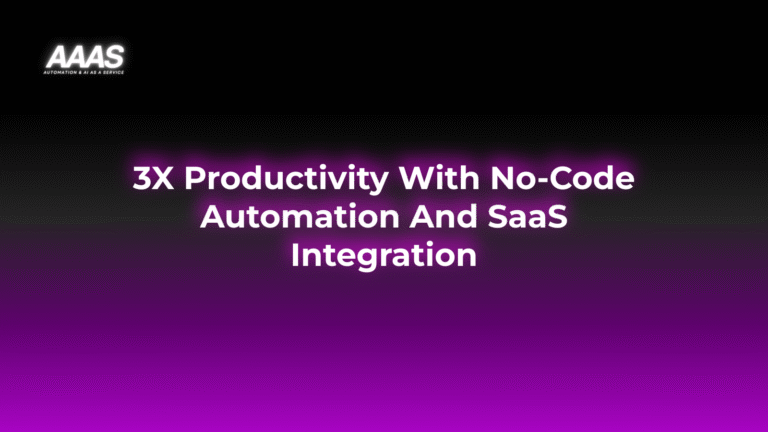Harnessing No-Code AI Tools to Automate Business Workflows for Productivity & Efficiency

Market Problem: Manual Workflows and Efficiency Bottlenecks
Businesses face costly inefficiencies from manual workflows: redundant data entry, fragmented communication, error-prone processes, and slow task completion. According to Gartner, businesses waste up to 30% of their annual revenue due to unoptimized workflows and repetitive manual tasks.
- Error-prone manual data handling
- Lack of process standardization across teams
- Slow adaptation to market changes due to rigid, manual processes
- Resource-intensive workflow updates
Traditional automation solutions are often expensive, require deep technical skills, and can take months to deploy, leaving SMBs and large enterprises alike searching for more flexible, affordable options.
No-Code AI Automation: Solution & Benefits
No-code AI tools empower non-developers to automate business workflows visually—without writing code. They leverage machine learning, cloud integrations, and user-friendly interfaces to streamline repetitive tasks, unlock new efficiencies, and reduce dependency on IT teams.
Key Benefits
- Accelerated Deployment: Design, test, and launch automations in days.
- Reduced Operational Costs: Decrease manual labor and human error.
- Scalable Adoption: Easily automate cross-departmental processes.
- Competitive Agility: Adapt workflows rapidly for new business needs.
- Enhanced Productivity: Free teams for higher-value work.
Real Use Cases Across Industries

- Customer Support Automation: AI-driven chatbots handle FAQs, appointment bookings, and ticket routing.
- Sales & Marketing: Automated lead scoring, email campaigns, follow-ups, and CRM updates.
- HR & Recruitment: Resume parsing, candidate screening, interview scheduling via no-code AI platforms.
- Finance: Invoice approvals, expense tracking, fraud detection with prebuilt AI automations.
- Logistics: Predictive inventory management, shipment tracking, and demand forecasting.
- SMB Operations: Syncing data between cloud apps, managing online orders, and automated reporting.
Technical Details: How No-Code AI Tools Work
No-code AI platforms offer drag-and-drop builders, prebuilt AI models, and plug-and-play integrations—making automation accessible for anyone.
Core Features
- Workflow Designer: Visual canvas to map processes step by step.
- AI Components: Pretrained models for tasks like NER, sentiment analysis, OCR.
- API & App Integration: Connect to CRMs, ERPs, spreadsheets, and cloud apps effortlessly.
- Conditions & Triggers: Set actions based on events, time, or data changes.
- Data Mapping & Enrichment: Transform and analyze information in real time.
- Monitoring & Logs: Built-in analytics for process optimization.
Popular Platforms
- Zapier (with built-in AI actions)
- Make (formerly Integromat)
- Microsoft Power Automate
- airSlate & UiPath (automation with AI modules)
- Parabola.io
Comparison: No-Code AI vs Traditional Solutions
| Aspect | No-Code AI Tools | Traditional Automation |
|---|---|---|
| Setup Time | Hours–Days | Weeks–Months |
| Technical Barrier | Low (visual interface) | High (coding/IT involvement) |
| Flexibility | High, instantly editable | Medium, require developer time |
| Cost | Subscription-based; low upfront | High upfront, maintenance required |
| Scalability | Cloud-based, scales with need | Often limited to IT bandwidth |
Popular No-Code AI Tools & Pricing
| Platform | Free Tier | Entry Paid Plan | Notes |
|---|---|---|---|
| Zapier | Yes (Basic) | $19.99/mo | AI actions & thousands of integrations |
| Make (Integromat) | Yes (Limited) | $9/mo | Visual workflow builder, unlimited steps |
| Power Automate | Yes (With Microsoft 365) | $15/mo | Deep Microsoft app integration |
| airSlate | Yes (Basic) | $19/mo | Document & workflow automation |
| Parabola.io | Yes (Free plan) | $80/mo | Advanced data manipulation |
Pricing as of July 2025. Check vendor sites for latest offers and enterprise plans.
ROI-Focused Practical Examples
Example 1: Reducing Admin Hours
A retail chain automated inventory data syncing using Zapier’s no-code AI rules. Results: Saved over 15 hours per month per location, reducing manual input errors by 85% and accelerating order fulfillment.
Example 2: Accelerating Customer Response
A SaaS company deployed AI-powered chat automation via Make, slashing customer support ticket response times from 4 hours to 10 minutes and improving CSAT scores by 30%.
Example 3: HR Screening at Scale
An HR agency used Power Automate’s AI templates to analyze resumes and schedule interviews automatically—processing 300% more applications with the same team size.
Step-by-Step Setup Guide
- Identify repetitive, rule-based processes ideal for automation.
- Select a suitable no-code AI platform matching your workflow needs.
- Map the process visually using the platform’s drag-and-drop interface.
- Choose prebuilt AI actions (e.g., language analysis, document processing).
- Connect integrated apps (CRMs, ERPs, cloud storage, messaging).
- Set triggers, conditions, and logic for automations.
- Test workflow with sample data and validate outputs.
- Deploy automations and monitor logs for continuous improvement.
- Train staff for ongoing optimization and governance.
Pros & Cons
| Pros | Cons |
|---|---|
|
|
Expert Tips for Successful Implementation
- Start small—automate one workflow, then iterate and expand.
- Engage key stakeholders early for buy-in and adoption.
- Evaluate data privacy & security compliance of chosen platforms.
- Establish clear success metrics (hours saved, error reductions, CSAT improvements).
- Document processes and maintain active governance for scale.
- Periodically review automations for optimization and deprecation.
Frequently Asked Questions
- What are “no-code AI” tools?
- No-code AI tools allow users to create AI-powered solutions via visual interfaces—without writing code. They combine drag-and-drop elements and prebuilt integrations.
- Are no-code AI tools secure for business data?
- Most leading platforms offer enterprise-grade encryption, SOC2 compliance, and audit logs. Always verify with platform vendors for data residency and compliance standards.
- How do no-code AI tools differ from RPA?
- No-code AI tools often focus on cloud-based, API-driven automation with built-in AI, while Robotic Process Automation (RPA) can include screen scraping and desktop automation with or without AI features.
- Is coding experience ever necessary?
- No-code tools reduce coding needs, but advanced automations may benefit from minimal scripting or integration with developer APIs.
- Can I scale automations company-wide?
- Yes. Many platforms support enterprise automation with team management, permissions, and audit trails.
References & Citations
- Gartner: 69% of Routine Work Will Be Automated by 2024
- McKinsey: The Case for Digital Process Automation
- Zapier: No-Code Automation Guide
- Microsoft Power Automate: Getting Started
- airSlate: No-Code Automation Benefits
Last updated: July 17, 2025








